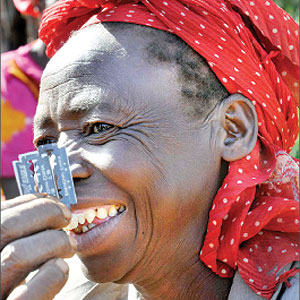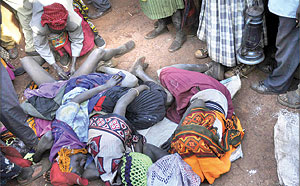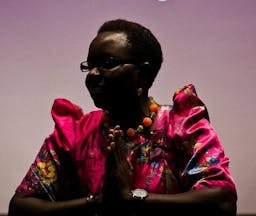"To hell with the law! We shall circumcise the girls", ELDERS in Bukwo and Kapchorwa districts --Uganda
May 13, 2019
Story



ELDERS in Bukwo and Kapchorwa districts are preparing to circumcise over 200 girls next month despite a new law banning the practice. They swear that the whole tribe would rather go to prison than abolish a custom they inherited from their ancestors.
The practice, commonly referred to as female circumcision, is mostly practiced among the Sabiny, who occupy Bukwo and Kapchorwa districts on the northern slopes of Mt Elgon. The United Nations categorises it as female genital mutilation (FGM) because it damages a woman’s sexuality and leads to various complications. FGM refers to the removal of the external female genitalia.
Accordingly, last December Parliament passed a law banning female circumcision. President Yoweri Museveni signed it into law on March 17, 2010 and it took effect on April 9, 2010.
The law argues that FGM infringes on the rights of the woman and also leads to health hazards, including excessive bleeding, death, birth complications and exposure to illnesses. The law criminalises the practice, calls for prosecution of offenders and protection of victims. Anyone caught doing it faces 10 years in jail or life imprisonment if the victim dies.
But the Sabiny are unfazed by this law. The vice-chairman of Bukwo district, John Chelangat, says over 200 girls are being prepared for the practice beginning on December 1 and neither he nor other political leaders are able to stop it. The men like it because circumcised women are less interested in sex and are, therefore, less likely to have extramarital affairs. The girls do not want to be considered outcasts, so they go for the knife.
“This is a very sensitive period and no politician will talk about abolishing FGM because we shall lose votes. Myself, I will not talk about FGM because I know this will land me into the political dustbin,” says Chelangat.
Consequently, as the December 1, 2010 circumcision nears, preparations to grace the ritual are in high gear in Sebei region.
In Bukwo district, the residents had a bumper harvest of maize, sorghum and millet that is being used for making local brew (Malwa) to entertain the revelers and also aid in performing sacred rituals, only known to the Sabiny people.
Kokop Chebet, 70, a mentor from Matibeyi village in Suam sub-county-Bukwo, says she has received applications from over 20 girls wishing to be prepared for the ritual.
“They came to me in January and I have been training them on how to go through the ritual. They told me they want to become women like others because they are tired of being scolded by the community that still calls them girls because they are not cut,” she adds.
Alice Kokop, 65, another mentor from Suam says she has also received about 15 applications from girls in Kabei sub-county wishing to be cut.
Other girls are to come from Chesower and Bukwo Town Council sub-counties. “I have already taken them through a series of trainings and they are about to be ready. We shall cut the first group in the first week of December,” Kokop explains.
Asked about the law prohibiting FGM, the two said a law cannot stop the cultural rite of the Sabiny people unless the community agrees with it.
Twenty-year-old Ana Chebet is a resident of Matibeyi village in Suam. Married with three children, Chebet has always been scolded by the community for not undergoing circumcision that passes her from childhood to adulthood.
“I cannot milk a cow or climb into the family granary. Whenever I go to the well, other women throw scorn at me because I am not cut,” adds Chebet, who will be one of the candidates this December.
She says mentors trained her how to dance when preparing for the ritual, the kind of food to eat, including posho, beans, honey and fermented milk to replace lost energy and blood.
Alice Chemutai, 17, another resident of Matibeyi, was convinced by her aunt to undergo female circumcision. But because she is educated she refused and her father supported her.
She recites an endless list of young girls who have dropped out of school to get married after the ritual and those who have had birth complications, bleeding and infections after.
“I will never get circumcised because this will not only infringe on my rights of womanhood but will also expose me to long-term health hazards. I am happy my father and mother support me against other relatives,” adds Chemutai, a Senior Three student at Amananga High School in Suam.
According to the law, a person commits aggravated FGM in situations where death occurs or where the victim is disabled or is infected with HIV/AIDS.
A person also commits aggravated FGM where the offender is a parent, guardian or person having control over the victim or where the act is done by a health worker.
The law punishes a person who commits aggravated FGM with life imprisonment.
A person who carries out FGM shall be imprisoned for a period not exceeding 10 years. People who participate or aid FGM shall be jailed.
The Sabiny people claim they do not fear the law and they are ready to die for FGM. “This law was not initiated or brought by the people of Sebei. It was brought by the people who do not understand why we carry out circumcision,” adds Alice Kokop.
According to Sabiny customs and traditions, female circumcision has been around for over 2,000 years and it is carried out to convert a female from childhood to adulthood. Females who are not circumcised are not called women and they are not supposed to carry out certain home activities like milking a cow, climbing into a family granary and talking with the elders.
Lack of funds for sensitisation keeps the ritual alive
BUKWO district vice-chairman John Chelangat says so many girls in Bukwo district are ready for the ritual partly because they have not been sensitised.
“Some people think the law does not exist and others believe the law was made for people who refuse to be mutilated rather than those that accept willingly,” he adds.
Last year, the United Nations Fund for Population Activities (UNFPA) promised to release about sh50m for sensitisation but up to now the anti-FGM campaigners are still waiting for the money.
Brenda Malinga of UNFPA admits they have not sent the funds to the districts because they are also funding about three bodies that are helping to get the law to work.
She says they are funding Reproductive Education and Community Health (REACH), an NGO fighting to eradicate FGM in Uganda to carry out community dialogue.
She promised UNFPA will disburse money to the districts for sensitisation in November.
But according to Beatrice Chelangat, the director of REACH, this is too late because FGM season starts in December.
Bugiri district has made strides. Wallace Foundation gave over sh100m to REACH and they have used the money to sensitise people.
Police vows stop the rituals
THE Police in the region have warned the community against FGM and vowed to arrest anybody involved, including the candidates, relatives or bystanders.
The Bukwo district Police commander, Michael Ongona, says he has already sent four officers to each of Bukwo’s 10 sub-counties to sensitise the people and also investigate FGM cases.
“We shall arrest the culprits. We are also having community dialogue and we believe we shall manage to kick FGM out of this region.”
Moses Chemonges, a lawyer based in Mbale, who hails from Bukwo, says the law requires everyone to report the cases. “If anybody hides the information or is seen to be turning a blind eye to any FGM activity, that person is supposed to be charged for obstruction of justice,” he explains.
Chemonges, however, doubted whether the Police or local leaders have the capacity to arrest the culprits. “The Police are understaffed and some of them are sons of the soil, who believe in the practice,” he adds.
He says the circumcisers and mentors have not been compensated. “There was a programme to compensate them because they derive income from the girls whom they prepare and then circumcise. “If these people are not compensated, there will be no motivation for stopping FGM.”
Sex is painful after FGM, says victim
Beyond the cut, a book by the NGO FEMRITE, documents the suffering of women who have undergone female circumcision.
Yemo of Bukwo wonders if women ever enjoy sex. For her it is always a painful experience. The most sensitive part of her private parts, which would enable her enjoy sex, was cut off during female circumcision. “I still bleed every time my husband and I meet. No matter how many times we have done it, no matter what we do, it never ceases to hurt,” says Yemo.
Judith was circucised in 1976. Since then, she has never had peace in her life.
“I was circucisized along with a cousin and a friend in 1976. The two died due to over-bleeding and related infections. I failed to walk and became permanently crippled.”
Judith says she has also lived a very difficult and expensive life because she has to cover the medical costs to treat the bleeding she often gets.
She fears she may die any time. She prays that FGM is abolished because it is a danger to women.
Key facts about FGM
Possible effects
• Excessive bleeding
• Septic wounds
• Bladder and urinary tract infections
• Infertility
• Painful sex
• Tetanus
• Childbirth complications
• Difficult urination
Statistics
About 100 to 140 million girls and women worldwide are living with the consequences of FGM.
It is mostly carried out on young girls between infancy and age 15 years.
In Africa, about 92 million girls from 10 years of age and above have undergone FGM.
FGM is internationally condemned as a violation of the rights of girls and women.
It is practiced in over 20 countries of Africa, including Benin, Chad and Guinea.




